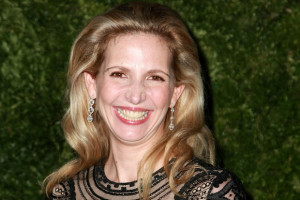The Spectator: Amanda Foreman’s diary: My inspiration as a Man Booker prize judge
So far my responsibilities as the 2016 chair of the Man Booker prize have been rather light. We’ve had our first meeting, received our first batch of books, and I’ve bought a smart notebook for record-keeping. I shall take a step back from journalism this year, including my Sunday Times column, but that doesn’t mean I shall be less active in the fight for freedom of expression. Some things are non-negotiable.
I’ve just read Open Letter by the late Charlie Hebdo editor Charb. He finished it two days before his death in the massacre on 7 January 2015. The book is aimed at both religious extremists and their apologists. ‘No form of discrimination,’ proclaimed Charb, ‘is better or worse than any other.’ If only the 145 writers who publicly protested against the 2015 PEN America award to Charlie Hebdo could be made to read his book. Perhaps it would shame them out of their smug self-righteousness. There is something disgusting about writers who defend the assassin’s veto. It’s such a perversion of power and victimhood. PEN refused to be intimidated. But it remains to be seen whether other institutions, such as universities, will stay true to their enlightenment values when we have a new generation of politicised purity trolls banging at the gates.
I served on my first literary prize jury almost 20 years ago. Yes, a few of the horror stories about them really are true. Some people take part because they think it will make them look good. Others do it out of a vague sense of duty that doesn’t extend to reading all the books. Then there are the bullies who make each meeting feel like an interrogation session. And let’s not forget the spoilers. Once, during final deliberations, I realised that a vociferous juror didn’t care what happened as long as he prevented a rival from winning. But it’s the stories you don’t read about that matter most. Behind the odd scandal and misstep that become media fodder is the unrecognised (and often unpaid) work that writers undertake so that their colleagues get the recognition they deserve. They do it in the belief that the pursuit of excellence lifts everyone. I was a Man Booker judge in 2012, the year that Sir Peter Stothard, editor of the TLS, was the chair and Hilary Mantel won for Bring up the Bodies. He ran each meeting with a purpose and intellectual zeal that made us all strive to be better versions of ourselves. The experience brought us together and we remain good friends. I shall do my best to keep the flame going.
Here in New York I’m getting ready for the last group meeting ahead of House of SpeakEasy’s annual fundraiser on 1 February. Our big push this year is to raise the money for a book bus — it will be like one of those ubiquitous food trucks one finds in big cities. Ours will go where there are no local bookshops. Salman Rushdie and Irvine Welsh are the headliners for the night — two writers who work tirelessly on behalf of the industry. I started this literary charity a few years back, having been inspired by the cabaret-style evenings put on by 5×15 and the work in schools done by First Story. The aim of SpeakEasy is to bring writers and audiences together in entertaining and innovative ways. We do community outreach in Harlem and run a commercial show in Manhattan called Seriously Entertaining. Many writers choose to take part in both. Oh, and one other thing: unlike certain literary festivals that shall remain nameless, we split the box-office receipts 50-50.
In the years since we’ve been putting on Seriously Entertaining, I’ve discovered that any kind of live show is a bit like a jury panel. Even the most meticulous planning and preparation is no match against human nature. I know now, for example, that it is unwise to take your eyes off the writer until he or she’s done with the performance. In our first year we had someone — let’s call him Donald — who arrived looking composed. But when Donald stepped out in front of 400 people he was completely high. As he giggled his way through his monologue, he began to have a love affair with his body. He was, as they say, clearly feeling it. Oh yes. He was alive to every physical sensation but not, alas, to our frantic signals to cut the overrun and get off the stage. In the end we had to drag him away. He lived, we learned. Life at SpeakEasy has been pretty smooth since then. Apart from the writer who attempted to read a speech from her mobile phone — but that’s another story.
The one question I’m always asked whenever I explain I’m writing a history of women is: ‘Are you starting with Eve?’ The fact that the first woman who comes to mind didn’t even exist says everything.
Amanda Foreman is, most recently, the writer and presenter of The Ascent of Woman on BBC2.

